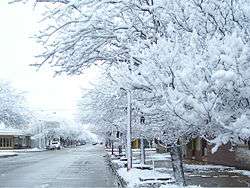sniegs
Latvian

Etymology
From Proto-Baltic (or Proto-Balto-Slavic[1]) *snaigas (> Latvian *snaigs, which, under the influence of forms of the verb snigt (“to snow”), became sniegs; compare Lithuanian snaĩgė (“snowflake”), still with the original ai), from Proto-Indo-European *snóygʷʰos, from the stem *sneygʷʰ- (“to snow”).
Cognates include Lithuanian sniẽgas, Old Prussian snaygis, Old Church Slavonic снѣгъ (sněgŭ), Russian снег (sneg), Ukrainian сніг (snih), Bulgarian сняг (snjag), Czech sníh, Polish śnieg, Proto-Germanic *snēwes, *snaiwaz (Gothic 𐍃𐌽𐌰𐌹𐍅𐍃 (snaiws), Old English snāw, Old High German snēo, German Schnee, Dutch sneeuw, English snow, Swedish snö), Old Irish snechtae, Ancient Greek νίφα (nípha, “snow (acc.)”), Latin nix (Italian, Portuguese neve, Spanish nieve, Catalan neu, Romanian nea).[2]
Pronunciation
- IPA(key): [snìɛks]
audio (file)
Noun
sniegs m (1st declension)
- snow (frozen water that falls as precipitation)
- sniegs snieg ― it is snowing (lit. the snow snows)
- sniega pārslas, kristāli ― snowflakes, snow crystals
- sniega ūdens, sniegūdens ― snow water
- sniega vīrs, sniegavīrs ― snowman
- sniega vētra ― snow storm
- smalks, dziļš, irdens sniegs ― fine, deep, snow
- slapjš, sauss, irdens sniegs ― wet, dry, powedery snow
- sniega kupena ― snow drift
- sniegs sāk kust ― the snow begins to melt
- sniega lāpsta ― snow shovel
- tīrīt sniegu no ceļa ― to clean, remove the snow from the road
- balts kā sniegs ― white as snow
Declension
| singular (vienskaitlis) | plural (daudzskaitlis) | |
|---|---|---|
| nominative (nominatīvs) | sniegs | sniegi |
| accusative (akuzatīvs) | sniegu | sniegus |
| genitive (ģenitīvs) | sniega | sniegu |
| dative (datīvs) | sniegam | sniegiem |
| instrumental (instrumentālis) | sniegu | sniegiem |
| locative (lokatīvs) | sniegā | sniegos |
| vocative (vokatīvs) | sniegs | sniegi |
Derived terms
References
- Kim, Ronald (forth.), “The Phonology of Balto-Slavic”, in Jared S. Klein, Brian Joseph, and Matthias Fritz, editors, Comparative Indo-European Linguistics: An International Handbook of Language Comparison and the Reconstruction of Indo-European, Berlin: de Gruyter
- Karulis, Konstantīns (1992), “sniegs”, in Latviešu Etimoloģijas Vārdnīca (in Latvian), Rīga: AVOTS, →ISBN